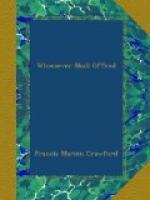Folco Corbario’s mourning was unostentatious and quiet, but none of the few persons who saw him, whether detectives or servants, could doubt that he was profoundly affected. He grew paler and thinner every day, until his own man even began to fear that his health was failing. He had done, and continued to do, everything that was humanly possible. He had brought his wife’s body to Rome, and had summoned the very highest authorities in the medical profession to discover, if possible, the cause of her death. They had come, old men of science, full of the experience of years, young men of the future, brimming with theories, experts in chemistry, experts in snake poisons; for Folco had even suggested that she might have been bitten by a viper or stung by a venomous spider, or accidentally poisoned by some medicine or something she had eaten.
But the scientific gentlemen were soon agreed that no such thing had happened. Considerably disappointed, and with an unanimity which is so unusual in the confraternity as to be thought absolutely conclusive when it is observed, they decided that the Signora Corbario had died of collapse after intense excitement caused by the disappearance of her son. Thereafter she was buried out at San Lorenzo, with the secret, if there were any; masses were said, the verdict of the doctors was published, with the signatures of the most eminent practitioners and specialists in Italy; and the interest of the public concentrated itself upon the problem of Marcello’s mysterious removal, or abduction, or subduction, or recession, or flight, from the very bosom of his family.
This problem had the merit of defying solution. In a comparatively open country, within a space of time which could certainly be limited to five minutes, at a place whence he should have been clearly seen by Folco Corbario as soon as Aurora dell’ Armi could no longer see him, the boy had been spirited away, leaving not even the trace of his footsteps in the sand. It was one of the most unaccountable disappearances on record, as Folco insisted in his conversations with the Chief of Police, who went down with him to the cottage and examined the spot most carefully, with several expert detectives. Folco showed him exactly where Aurora had stood, and precisely the direction he himself had followed in approaching the gap, and he declared it to be almost a physical impossibility that Marcello should have become suddenly invisible just then.
The official thought so too, and shook his head. He looked at the detectives, and they shook their heads, also. And then they all looked at Corbario and expressed the opinion that there was some mistake about the length of time supposed by Aurora to have elapsed between the moment when Marcello left her and the instant of Folco’s appearance before her. She had not looked at her watch; in fact, she had not carried a watch. The whole story therefore depended upon her more or less accurate judgment of time. It might have been a quarter of an hour instead of five minutes, in which case Corbario had not yet left the cottage, and Marcello would have had ample leisure to disappear in any direction he pleased. Ercole had been away at Porto d’Anzio, the men had been all at the hut; if Folco had not been on the path precisely at the time guessed by Aurora, everything could be accounted for.




